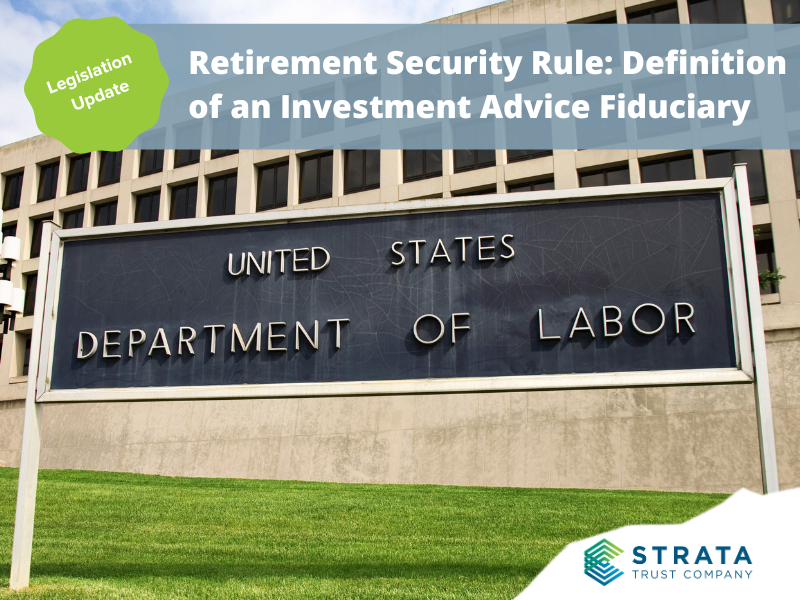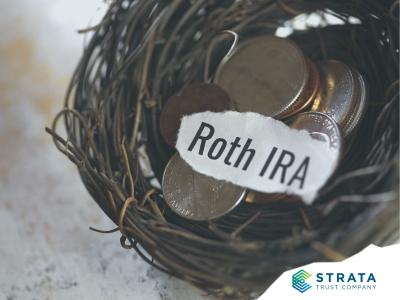After years of wrestling with the best way to balance the needs of retirement plan savers with the investment industry’s compensation models, the Department of Labor has taken another crack at rewriting the fiduciary rules. Since 2010, the important question of who is considered a fiduciary when providing retirement investment advice or recommendations has been tough to answer definitively. With the release of the DOL’s new proposed rule, we hope to gain more clarity, especially on the question of who is considered a fiduciary when it comes to providing investment advice to IRA owners, including those who own self-directed IRAs (SDIRAs).
Summary of the New Rule
On October 31, 2023, the Department of Labor (DOL) released proposed regulations defining “investment advice fiduciary.” This definition is important because it dictates the standards under which many investment professionals must act when working with clients. It could require more diligence by these professionals, and it may hold their feet to the fire by giving their clients more remedies for failing to act with the appropriate standard of care.
According the DOL’s Fact Sheet on the new rule, many retirement savers are subject to investment costs that reduce their financial preparedness. To address these concerns, the investment advice fiduciary rule is designed to close loopholes that have prevented investors from getting recommendations that are in their best interest, cover advice that is given to investors about rolling over assets from their employer-sponsored retirement plans, and address investment recommendations that are given to employers about their plan investments.
The DOL’s new rule defines an investment advice fiduciary as a person who:
- Provides investment advice or makes an investment recommendation to a retirement investor,
- Provides this advice for a (direct or indirect) fee or other compensation, and
- Makes the recommendation in one of these contexts:
- The person has direct or indirect authority or control to buy or sell retirement assets for the investor,
- The person regularly makes investment recommendations to investors as part of their business, or
- The person acknowledges or represents that they are acting as a fiduciary.
Some in the industry believe that this rule will limit the access that some investors have to investment advice. Despite this objection, the DOL has written the proposed regulations to “ensure that retirement investors’ reasonable expectations are honored when receiving advice from financial professionals who hold themselves out as trusted advice providers.” The rule’s purpose is to protect retirement investors’ interests by putting stringent conduct standards in place for investment advice providers to adhere to and mitigate any conflicts of interest. The DOL also expects that the new definition will help retirement investors by creating a more uniform fiduciary standard, irrespective of the investment product.
A Brief History of the Fiduciary Rule
The Employee Retirement Income Security Act of 1974 (ERISA) has defined the term “fiduciary” for nearly 50 years. Whether or not someone is considered a fiduciary is critically important because fiduciaries are held to the highest standard of care that the law imposes. Among other things, fiduciaries must subordinate their own interests to the interests of plan participants and beneficiaries and must act as prudent experts in fulfilling their duties. Not to mention, there are consequences for failing to meet this high standard of care – fiduciaries can be held personally liable for breaching their obligations.
Shortly after ERISA was enacted, the DOL issued regulations that refined the statutory definition of “fiduciary” for purposes of clarifying when those providing investment advice would be considered fiduciaries. The result was a five-part test that has been used for nearly 50 years. But times have changed, and the five-part test seems not to address the variety and complexity of financial products and services or the way that many financial professionals conduct business. So after several rounds of proposed regulations, comment periods, and public hearings, the DOL released a new final fiduciary rule in 2016.
Without recounting the tumultuous course that got us here, let’s simply note that ultimately, the U.S. Circuit Court of Appeals for the Fifth Circuit invalidated that rule, so the DOL had to start the rulemaking process again. This brings us to where we are today.
How Does the New Rule Affect IRA Owners?
Perhaps the most important change is that the new rule attempts to lock in the DOL’s commitment to ensuring IRA owners get reliable investment advice. Once the proposed rule becomes final, IRA owners will benefit in at least two different ways.
 The DOL is using its delegated authority to expand the types of plans that are covered by the rule. Normally, we think of the DOL regulating 401(k) plans and other plans that are subject to ERISA. But under the new rule, the DOL is specifically including those that give investment advice or recommendations to IRA owners as fiduciaries.
The DOL is using its delegated authority to expand the types of plans that are covered by the rule. Normally, we think of the DOL regulating 401(k) plans and other plans that are subject to ERISA. But under the new rule, the DOL is specifically including those that give investment advice or recommendations to IRA owners as fiduciaries.
 The DOL is also clarifying that financial professionals that advise or recommend a rollover of plan assets to an IRA (and get paid for the advice) may be held to the fiduciary standard even if it’s a one-time transaction, which requires the adviser to place the IRA owner’s interests above all others when making the recommendation.
The DOL is also clarifying that financial professionals that advise or recommend a rollover of plan assets to an IRA (and get paid for the advice) may be held to the fiduciary standard even if it’s a one-time transaction, which requires the adviser to place the IRA owner’s interests above all others when making the recommendation.
What’s Next?
The 60-day period to comment on the proposed rule closes on January 2, 2024. The DOL expects to hold a public hearing sometime in mid-December. After the hearing and a review of the comments, the DOL will draft a final rule. This final rule will become effective 60 days after it is published in the Federal Register.
Considering the DOL’s efforts to create a more effective fiduciary rule since 2010, it seems likely that it will keep pushing for a rule that will withstand the expected legal challenges. The Department will continue to argue that consumers need to be able to rely on the advice that is given by financial professionals that they trust. Meanwhile, those who give retirement investment recommendations or advice for a fee—and those who get this advice—will want to pay close attention to how this debate unfolds.









